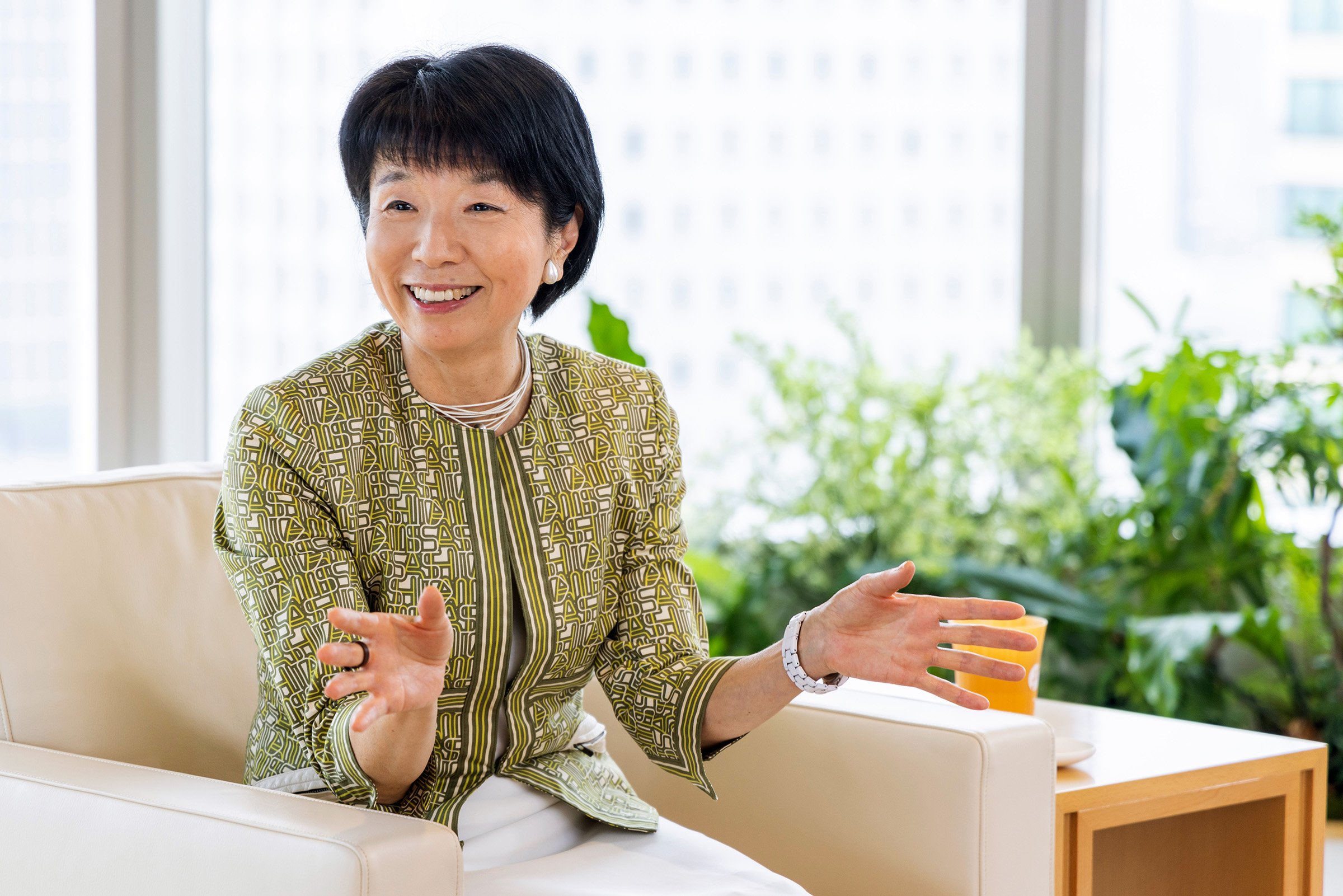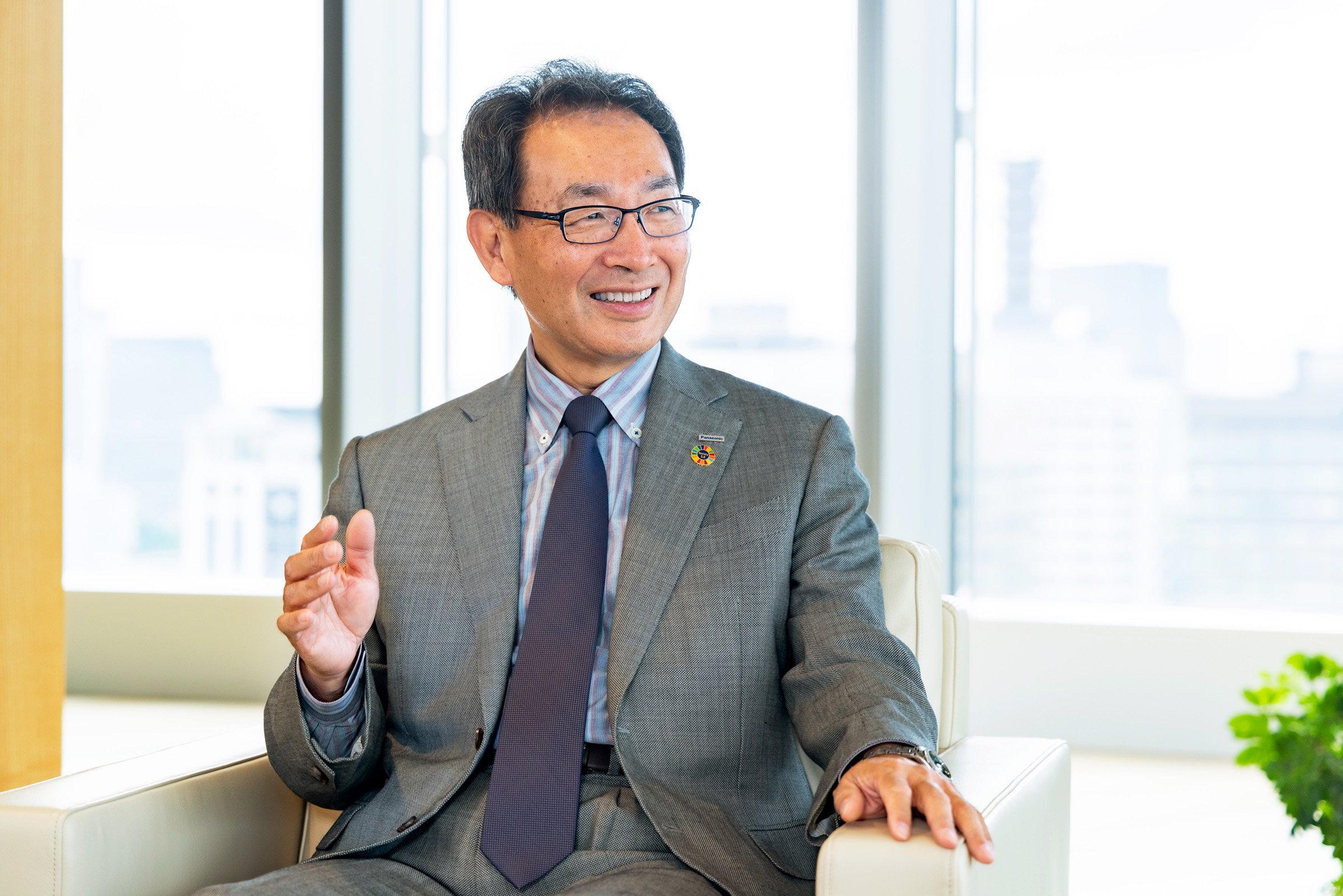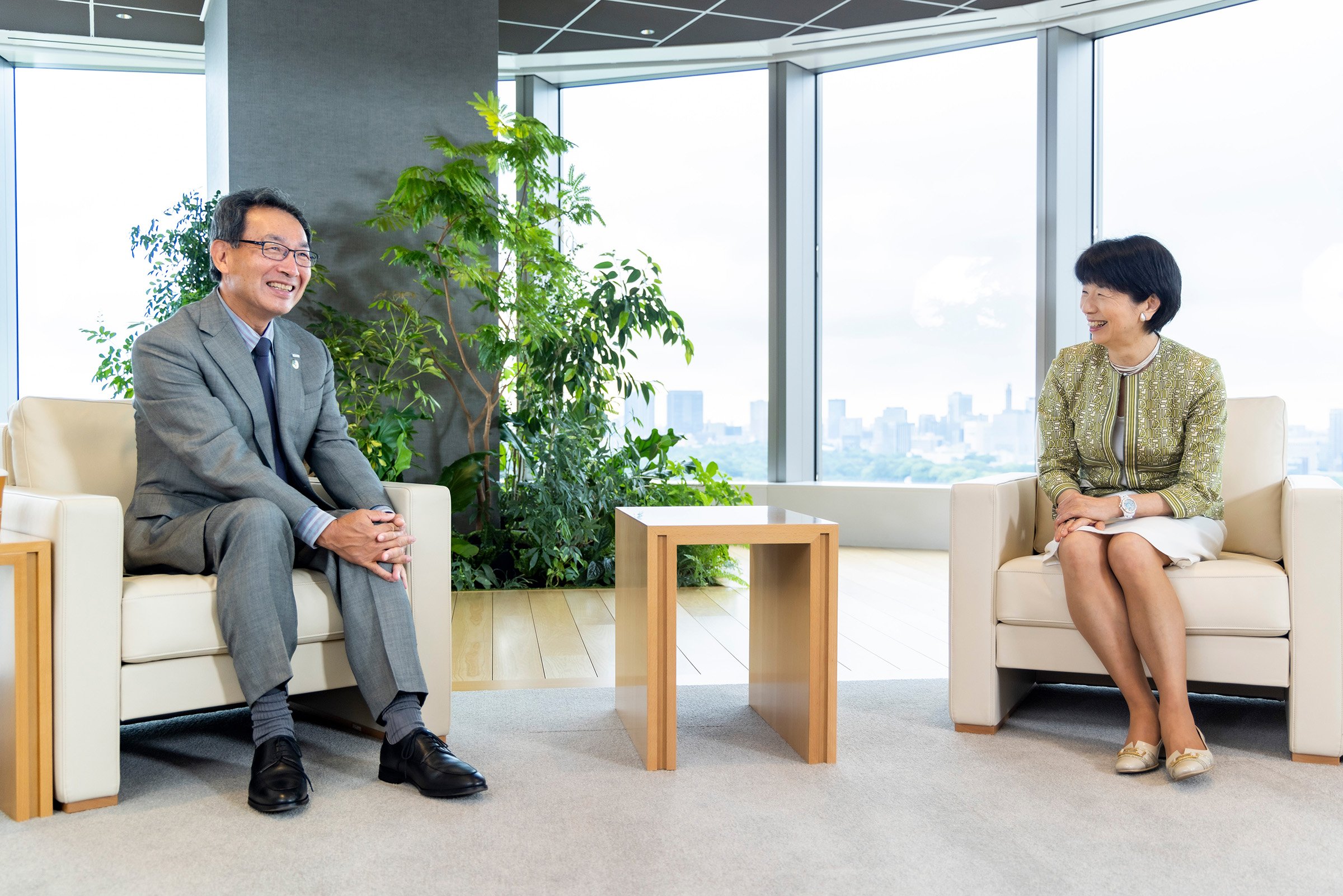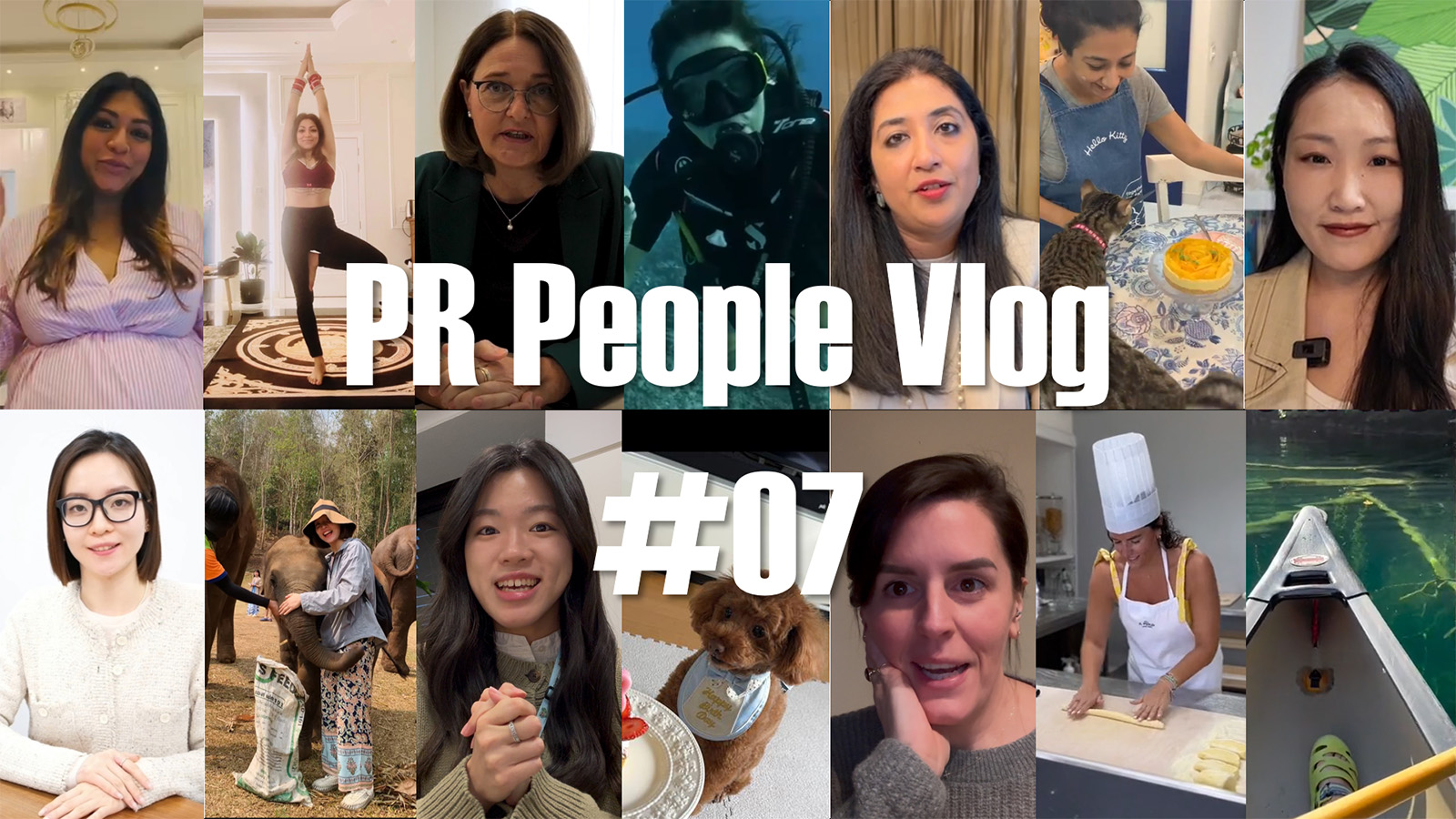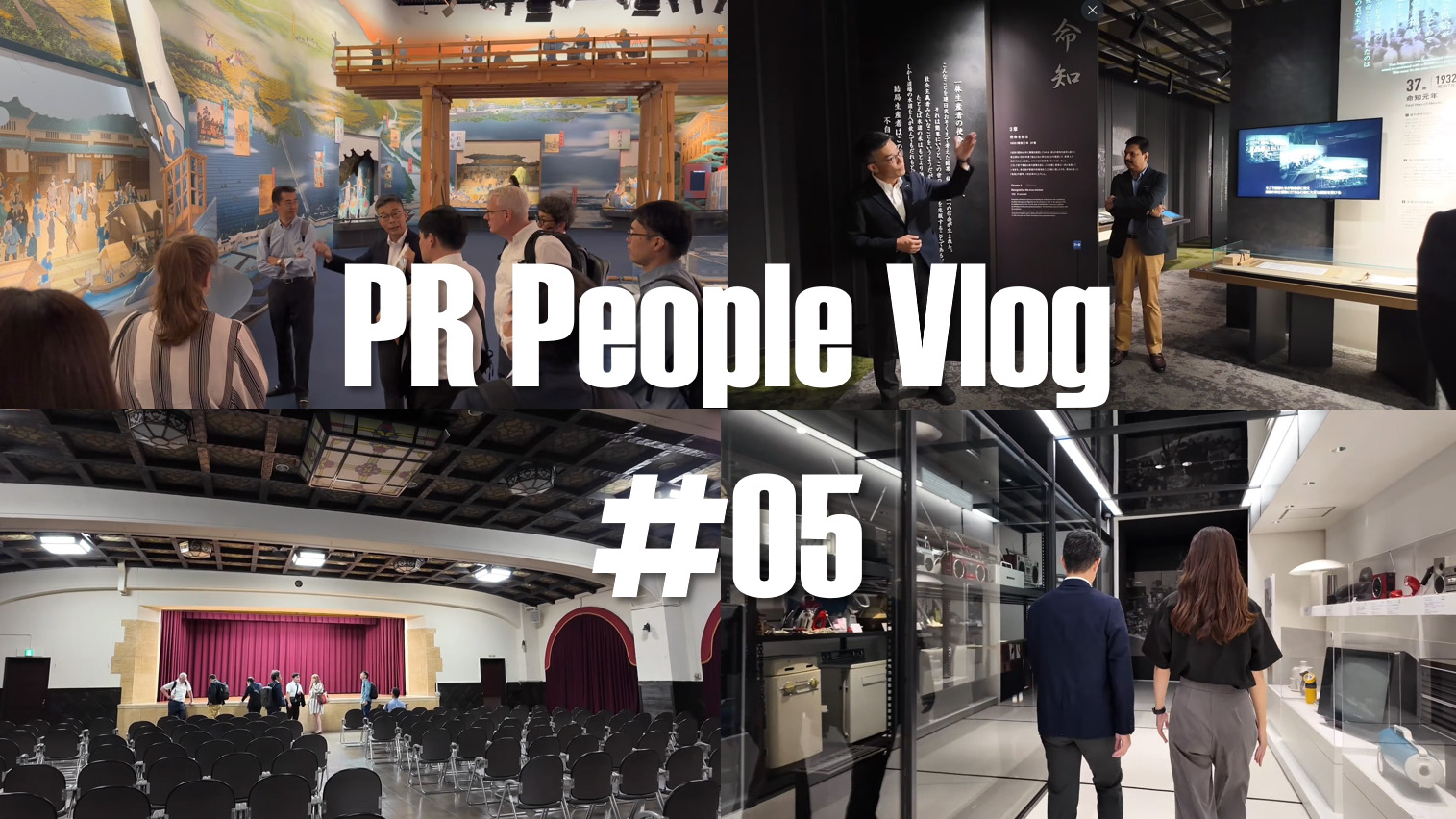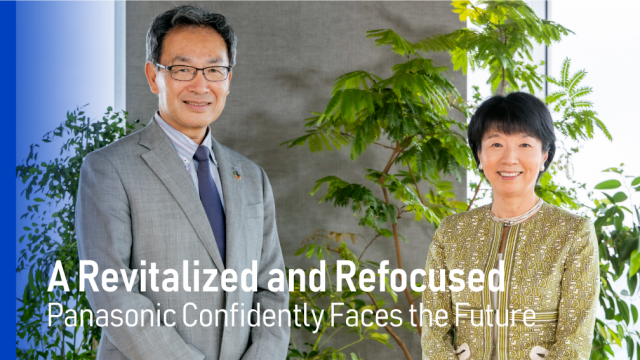
Hiroko Ota supported Panasonic's management operations for nine years, from the time of her appointment as an Outside Director of the company in 2013 until her retirement from that post on June 23 this year. During that time she made a significant contribution to the company's transformation efforts.
How has the Panasonic Group evolved and transformed itself over those past nine years, in terms of management, corporate culture and governance? And what will be required of the Panasonic Group in the future? Ota, who has seen a lot of the company's management operations up close, and Kazuhiro Tsuga, who is Chairperson of Panasonic Holdings and who has accompanied her on her professional journey over almost the same period as President, give us their thoughts on these issues.
The Panasonic Group has really changed over the past nine years.
Looking back over that period, how do you see those changes?
Ota: There has certainly been dramatic change during that time. In my early days with the company, board meetings were held with flowers placed in the middle of the meeting room. All of the men wore ties, even in midsummer. I thought this was amazing!
But I really liked Panasonic from the beginning. It would be hard to find another company with such integrity. But if too much energy is directed inward trying just to do things right, it can lead to a company focusing only on form.
I became an Outside Director in 2013, one year after Mr. Tsuga was appointed President. After his appointment he declared, "We are not a normal company at the moment." The company had many commendable qualities of course, but at the time it took a strongly technical approach - it wasn't thinking from the customer's point of view. Superior in its technology, it tended to base its initiatives on that, rather than on actual customer needs, and as a result it often came up with features that customers didn't feel they needed. Also, customers often didn't understand what direction the company was trying to move in. But during the nine years since then, we've been steadily resolving those issues.
Tsuga: I think we are getting a little closer to where we should be. But we're just beginning to figure out whether we are providing what the customer really wants.
Ota: I love manufacturing sites, and I've visited many of them in Japan and abroad. Each site is amazing, and run with such ingenuity and care, down to the smallest details. But my impression, honestly, was that while they were making many excellent products, the earning potential of those products was weak.
Tsuga: The reason our company had not changed to any significant degree was because, to put it simply, we weren't good at "subtracting." Of course, factories operate based on the idea of improving the product as much as possible. So they are good at "adding" this or that function. The underlying belief was that repeating this "adding" process would keep competitors at bay. But I think we were gradually losing sight of whether those additions were really meaningful for our customers. I think it was difficult for us to work up the courage to make drastic decisions favoring "subtracting."
Ota: Even as someone with little knowledge of profit potential, I thought that the only way to improve earning power was to adopt a holding company system, where each business entity must be prepared to fight with its back to the wall. But it took a variety of reforms to get there. Under your leadership, Mr. Tsuga, visualization of all the business entities progressed, and I have the impression that structural reforms picked up speed about three years before you left the position of President.
Tsuga: That was when Panasonic Corporation, Panasonic Electric Works and Sanyo Electric became one company. With each of those companies having their strong points, we decided to bring them together under the in-house slogan "Cross-Value Innovation." This included personnel exchanges, structural reorganization, and respect for individual preferences, until the three businesses truly became one entity. Once we had reached a certain level of success with these efforts, we decided to mold the company into a form that would make it easier to move forward toward its ideal state. During the last three years or so, we've made progress toward realizing our concept of the form the company should take. Actually, I didn't expect to be President for nine years (laughs).
We want each and every employee to find joy in their work, and channel their energy outward to realize their full potential
Ota: The past nine years were really a struggle. Each year was so tough. That's probably why I found it so hard being a leader. And the nation's transition to digitalization moved forward so quickly. The Panasonic Group hired talented people from outside, and strengthened communication within the company. The company newsletter also clearly conveyed the message that you, Mr. Tsuga, wanted to communicate, with a new emphasis on design-driven management and software. However, this shift in the business model was not easy to implement, since it meant ignoring some success models of the past.
Tsuga: Hardware on its own will continue to lose value. In the final analysis, services are what's valuable. Hardware and software only exist to provide those services. If we don't understand this, no matter how much we proclaim "The customer comes first," we will end up prioritizing yesterday's customer needs, which revolved around hardware. In Panasonic signature stores today, employees go beyond what is required to help customers who experience device breakdowns or damage. The stores do deal with hardware on an everyday basis, but their main focus is helping customers. I believe that companies that are not willing to go that extra mile will not be chosen by customers anymore.
Ota: The Panasonic Group is extremely well equipped for success. Few companies are so willing to respond seriously to what consumers say. However, while the company amply exhibits the mindset to put itself in the customer's shoes, it can also be rather resistant to change, and biased toward maintaining the status quo.
Tsuga: I suppose we are resistant (laughs). I think one reason for that is, because we experienced so many failures in the past, we acquired this mindset of trying not to make any more mistakes. But if we don't challenge ourselves, there may be no real failure, but no real success, either.
Ota: Digitalization is meaningless unless it takes the customer as the starting point. The Panasonic Group most certainly knew that. But it wasn't used to putting it into practice.
Tsuga: To follow up on your thoughts, I guess we weren't really listening to what our customers were saying. We probably still thought, deep down, that if our products were good, if we mass-produced them, and they were used far and wide, we'd be recognized for our great contribution. That was half right, but also half wrong.
Ota: The Panasonic Group's manufacturing expertise is always creative. If that creativity and ingenuity are closely aligned with customer needs, and if the process of trial and error starts with trying to grasp their real needs, I believe the potential of each and every employee will be fully realized. Panasonic is a really good company, and highly reliable, but it doesn't come across as dynamic, interesting, or proactive. I believe its true power will emerge when each employee discovers joy in their work, and when that joy is channeled as outward energy, instead of inwardly. The company has so many talented people, and I would love to see them fully blossom outward.
Tsuga: I hope that our transitioning to an operating company system will at least encourage all employees to voluntarily take the initiative, rather than feeling like they are forced to do things.
Ota: The Wild Knights were the inaugural champions of Japan Rugby League One. Just like in a rugby game, each individual needs to intuitively grasp changes in their surroundings and the direction they should head toward, all while thinking and making decisions, acting as a team while changing strategies in a dynamic way. I hope the Panasonic Group organization will be like this in the future.
Frank, full-blown discussions at board meetings
How do you think governance principles have evolved in the various parts of the company's organization, such as its Board of Directors and the voluntary Nomination and Compensation Advisory Committee? This question is especially pertinent, since you were the first chairperson of that committee.
Ota: What is great about the Panasonic Group is that when it decides to change, it commits to that change wholeheartedly and shifts direction right away. Since Panasonic HD is a company with a Board of Auditors, it has a voluntary Nomination and Compensation Advisory Committee, even though this is not mandatory under Japan's Companies Act. Usually, in the case of a voluntary "advisory" committee, the current president in effect decides who will be the next head of the company, and the role of the committee is to simply examine whether the appointment process was above-board. But Panasonic is totally different. Members of the committee who were outside directors interviewed presidential candidates over and over, and the committee as a whole held really frank discussions. They didn't care if the current president was in attendance. Even in an ordinary nomination committee in Japan, it's not easy to discuss things so freely.
Tsuga: In the past, since nobody spoke up at board meetings; the chairperson would say, "Since there are no comments, I will now ask you some questions," but things have really changed since then.
Ota: I'm not very knowledgeable about business matters, so my remarks were probably off the mark, but I made a deliberate effort to speak every time, even if my comments were poorly aimed shots. It's important for any organization to have that "one person who you never know what they are going to say" (laughs). Now there are so many people who speak up, and the conversation doesn't stop.
Tsuga: Ms. Ota made a point of stating that she was not a management professional. But a lack of that expertise is actually necessary at times. Opinions given only by management professionals will inevitably skew the discussion.
Ota: The Board of Directors that you have now is wonderful. Everyone speaks frankly. When it came to appointing new outside directors, the kind of people Mr. Tsuga wanted most were those who were outspoken. He wanted someone who spoke straightforwardly without embellishing anything, not someone who was a big name, or someone with a sizeable reputation in the outside world, or a specific type of person, such as a woman. I think that's wonderful. Of course it may not be easy on the chairperson!
Tsuga: When so many people say exactly what they think, keeping track of time can become quite difficult (laughs). You mentioned neckties - at first, we felt that our outside directors were important guests, so we didn't want to be discourteous in any way. If I were to venture an expression, I would say that I feel Ms. Ota "opened up" the Panasonic Group to the world. The Board of Directors and outside directors became conspicuously more active, and there was then really no way the executive side of the company could keep to their old way of doing things. We're changing; now we discuss things together, and even if an idea is half-baked, we may pro-actively bring it up before the Board of Directors.
Ota: Discussions go straight to the heart of the matter, don't they? I would like to add, however, that at the Panasonic Group, from the very beginning of my time there, people didn't act like they were thinking, "How can outsiders know what we need to know?" They didn't pretend to have listened, and then say only as a matter of form, "Thank you very much for your valuable opinions, which originate so admirably from your extensive experience." The company was always very sincere in listening to the opinions of its outside directors.
Tsuga: That is proof of just how urgently we felt the need to make the extra effort to improve.
We want the company to feel confident and embrace change. The good things about Panasonic will not change.
Thank you very much for your valuable comments. Finally, could you please each make a few closing remarks?
Tsuga: Ms. Ota, I thank you for your long service over nine years as an Outside Director. You mentioned visits to manufacturing sites, and you did indeed help us by visiting many. In that way, too, you took on your responsibilities as an Outside Director after diligently studying the Panasonic Group and carefully considering how you could best fulfill your role based on what you learned. The other outside directors sensed this as well, and this helped things turn out well. We are truly grateful. Now we will make sure that we achieve results, and as you mentioned earlier, we will strive to create a company where each and every employee finds joy in their work, is excited by their work, and is fired up with the desire to "get things done."
Ota: I'm really proud to have been involved with the Panasonic Group. Around the time I first met Mr. Tsuga, he was facing a lot of criticism from the media. At the time, I said to him, "It must be very difficult to have so many things written about you." I was surprised when he replied calmly, "It doesn't bother me all that much." I felt sure then that he was a no-nonsense person who would bring out the best qualities of the Panasonic Group!
After nine years of Mr. Tsuga's struggles, the stage is now finally set for change. It is already becoming a company full of energy, and when each individual's potential is realized, the underlying strength of the Panasonic Group will rise to the fore. I'm sure the company will change in this way. It can stay confident, however much things may change. Because what's good about Panasonic will not change. That is my conclusion after being involved in the company for such a long time. No matter how much its products or its organizational makeup change, the pride of the Panasonic Group, the core of what it has built over the years, will not change. It's OK to "start anew every day." I wish you the best as the company pursues change with confidence.
Tsuga: Thank you for your wonderful words of encouragement. Many people are instinctively afraid of change. That's because they are afraid they might lose something. But, as you said, Ms. Ota, good qualities are not easily lost. Thank you so much for your time today.
Ota: Thank you!
This dialogue was conducted in accordance with infection prevention measures.
Biography of Ms. Hiroko Ota
Since graduating from Hitotsubashi University in 1976, she has worked as a researcher at the Japan Institute of Life Insurance, as visiting assistant professor at Osaka University, as assistant professor at Saitama University, and as professor at the National Graduate Institute for Policy Studies. From 2002 to 2005, she served as Counselor in the Japanese Government's Cabinet Office, as Deputy Director General and Policy Chief in the Minister's Secretariat, and from 2006 to 2008, as Minister of State for Economic and Fiscal Policy in the Cabinet Office in the Abe and Fukuda Cabinets. In August 2008, she returned to her post as a professor at the National Graduate Institute for Policy Studies, where she is currently a Distinguished Professor. Served as an Outside Director at Panasonic from June 2013 to June 2022.
# # #
Disclaimer:
We would like to note that Panasonic Newsroom is not a place to address personal Customer Service issues. Even though this is not the forum, Panasonic is always eager to resolve your concerns. Our local customer services contacts can be found at Global Support or you can see our list of Social Media Accounts to find the right channel for your queries and concerns.

